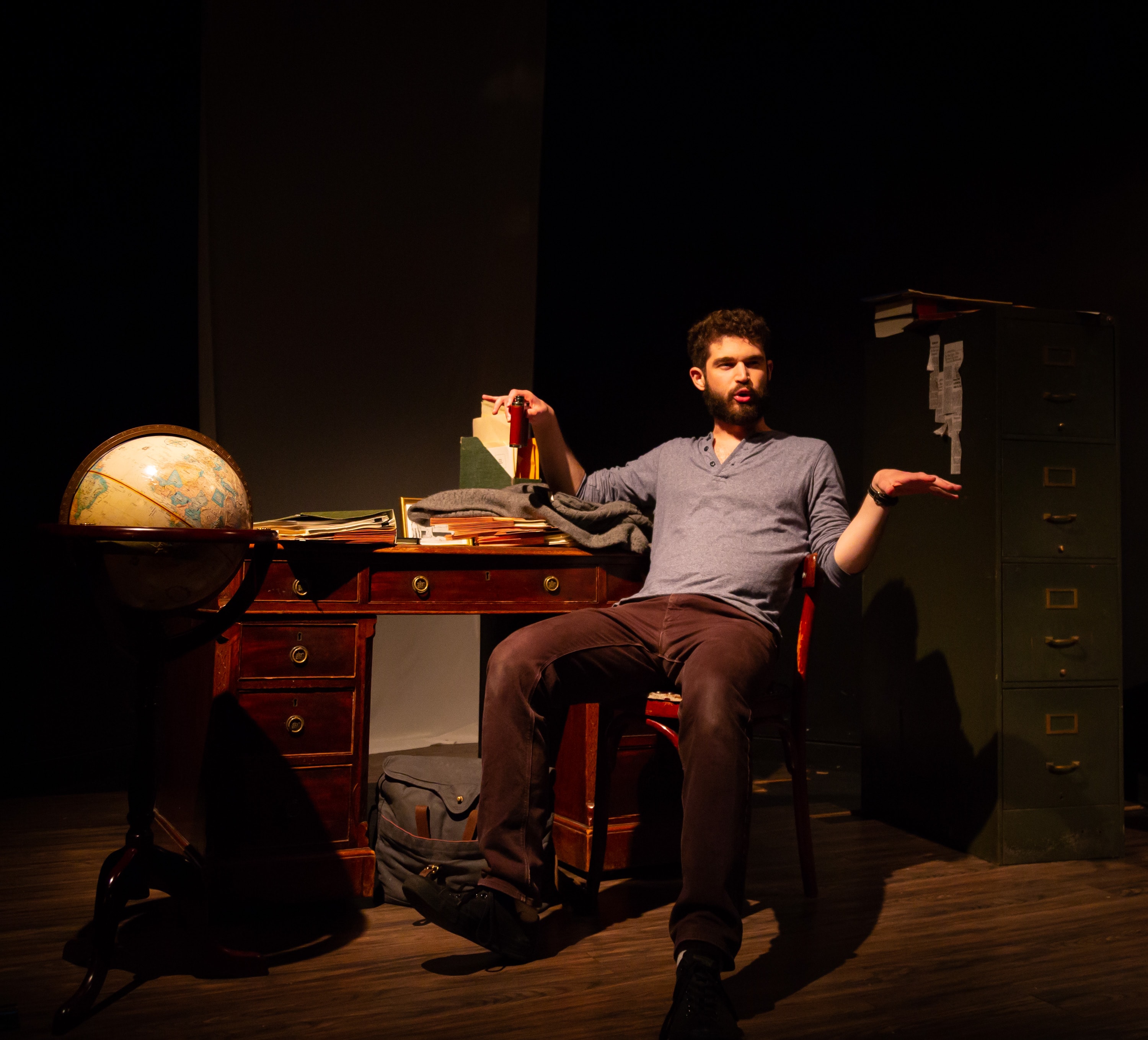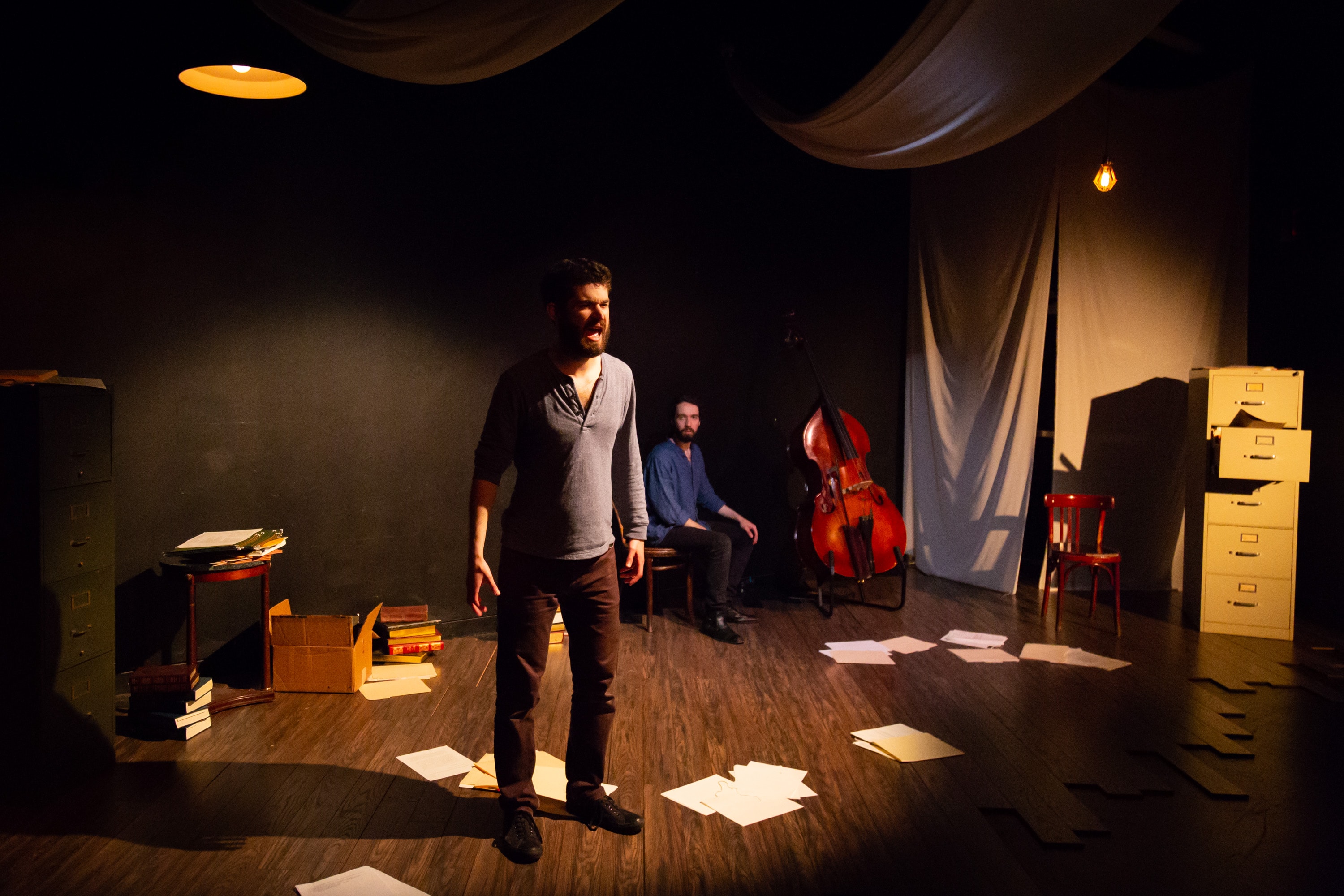The setting (designed by Daniel Prosky) is not a battlefield in Anatolia in modern day Turkey, but what appears to be the office of an academic – perhaps a classicist. There is no computer on the hand-crafted wooden bureau; instead, leather-bound volumes with gold tooling are stacked everywhere. The chairs are in the ubiquitous yet elegant Vienna style. Vertical steel file cabinets are the only nod that office technology has advanced beyond the late nineteenth century. As the audience settles in their seats, the Muse, played by musician and composer Matt Chilton, plucks his bass, keeping a rubato tempo and alternating between the more familiar western modes and the hijaz scale.

The lights darken and the Muse disappears. In rushes the Poet (Iason Togias). With his beard, cardigan, skinny jeans, long sleeve henley shirt, and courier bag, he wears the iconic uniform of male hipsters for the last quarter century – just the sort one expects to see at a poetry open mic. He stumbles at first, not knowing where to start his telling of The Iliad: does he recite the archaic written Greek in dactylic hexameter? Should he echo the heightened English of Robert Fagles’ translation? Or perhaps he ought to try the vernacular style of standup?
After some false starts, his Muse (gender-flipped in this production, as Calliope was the goddess whom Homer was invoking) returns to him – quite literally, when Chilton returns to the stage.
Playwrights Lisa Peterson and Denis O’Hare, in adapting Robert Fagles’ translation of Homer, have envisioned their Poet as being traumatized both by the carnage he witnessed in Anatolia and the constant reliving even as he sees one parallel after another with the litany of wars that have occurred in the nearly three millennia since he began his recitations. The technologies and tactics may have changed, but so long as war is perennial, so is The Iliad.
The Peterson and O’Hare adaptation does not claim to be The Iliad, but rather, An Iliad, one of many possible Iliads. This one is aimed at a country forty-five years into a policy of an all-volunteer military force and fighting its seventeenth year of the War on Terror. Only a small segment of the populace has served or is likely to serve; only a minority of Americans with strong opinions on the war or its conduct has skin in the game. But Homer’s descriptions of violence remain visceral. This production, helmed by Director Conor Bagley (Peterson and O’Hare’s adaptation was previously staged in D.C. by Taffety Punk in 2016) has been crafted for America’s Millennial generation with childhood memories of the 9/11 attacks, and an entire adulthood with the subsequent wars in their media background
[see David Siegel’s recent interview with Bagley, Chilton, and Togias]
Some of the best-known stories related to the Trojan War, such as the Trojan Horse, do not actually appear in Homer’s epic, which focuses on the wrath of Achilles in the ninth year of a ten-year-long war. As the tale begins, Agamemnon, the commander-in-chief of the Confederation of Greek armies at war with Troy has offended against the god, Apollo. He has abducted Chryseis, the daughter of one of Apollo’s priests, to use as a concubine. When he refuses to accept a ransom, Apollo punishes the Greek armies with plagues. Agamemnon decides that if he must give up his spoils of war to lift the curse, he must be compensated and so takes Achilles’ concubine, a captured princess of Lyrnessus named Briseis whom Achilles considers as a bride (it is a feature of The Iliad that the distinction between romance and sexual enslavement is far too blurry for our twenty-first century sensibilities). Achilles, the Greeks’ greatest warrior, announces that he refuses to serve under Agamemnon and leaves the battlefield, only returning to get vengeance after his closest, most intimate, friend, Patroclus, is killed by the Trojans’ greatest warrior, Hector.

When Togias’ poet is joined on stage by Chilton’s muse, the power of this ancient tale is brought into the present. Togias is an actor of immense skill and gravitas, but in keeping with Bagley’s conceit to emphasize the relationship between Poet and Muse, Chilton is no mere accompanist. Now bowing his instrument, he evokes different moods with long aggressive strokes to anxious spiccato, to haunting harmonic melodies. The two are feeding off one another, adjusting to each other’s rhythms and tones. Likewise, though the Muse has no spoken lines, the interaction between the two performers, communicates just how invested the gods are in having the poet survive yet another millennium to continue telling the story.
Togias’ control of his body, even more than his voice, allows him to take the forms of the various characters: warriors of both mortal and god-like countenance, the gods and goddesses who have taken sides in the war, and those, whether because of age, gender, or cowardice, are non-combatants. He embodies them all without a costume change.
In performing a war story, it is important that he physically communicates the violence, portraying both the skill and strength needed to wield instruments of war and the destructive impact they have on the body. And just as he goes without a costume change, he does this without a prop weapon of any sort. Like any good mime or figurative sculptor, he understands that so much drama is expressed in the bending of legs, and the torsion and tilt of each discrete part of the body. His ability to work with different muscle tensions, combining stillnesses with both swift and slow movements creates an onstage dynamism that is mesmerizing. What has become a gimmick in motion picture fight choreography since the invention of digital film, however, is powerfully visceral in the flesh, where the actor becomes the special effect.
And while there is much power in those fights between Hector and Patroclus and Hector and Achilles, or when the goddess Strife visits violence on both sides, there are moments just as evocative in those mythic moments when Hephaestus, god of metalworking, casts Achilles a new suit of armor, or those more intimate scenes when Hector leaves the battlefield to visit his wife, Andromache, and their infant son, Astyanax, when the elderly King Priam comes as a supplicant to beg for his father’s body, or when the Poet himself becomes overwhelmed by seeing the same tragic ending in sight for perhaps the three-hundred-thousandth time.
In those brief moments early on when Peterson and O’Hare do seem to be trying their hardest to pander to Millennials – adopting some of the stereotypical phrasing one encounters on social media and sitcoms – the script stumbles a bit. However, it becomes easy to forgive what prove to be minor flaws once the playwrights allow their Poet to call forth the voices needed to tell the story.
Running Time: Approximately 100 minutes, with no intermission.
An Iliad plays through June 9, 2018, at Atlas Performing Arts Center – 1333 H St NE, Washington, DC. For tickets, call the box office at (202) 399-7993, or purchase them online.




